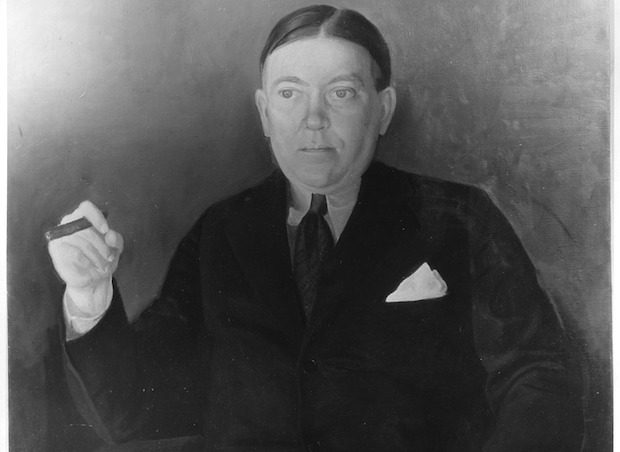H.L. Mencken’s Merry Days

It’s a testament to the caustic fluid in H.L. Mencken’s inkwell that critics continue to repeat his aphorisms about the stupidity of boobus Americanus and the insanity of trusting him to govern himself. “Democracy,” he wrote in 1916, “is the theory that the common people know what they want, and deserve to get it good and hard.” Nearly a hundred years later, the quip can still blister—like a canister of mustard gas accidentally unearthed in a farmer’s field in Flanders.
Yet this thumbing of quotation dictionaries by the disaffected or defeated seems to have cast about Mencken the aura of an unrepentant misanthrope. True, over the Sage of Baltimore’s decades-long career he expressed contempt for many things. But he could also be quite the charmer. Anyone who doubts it might pick up the Library of America’s new Days Trilogy: Expanded Edition, which collects the three of Mencken’s memoirs published during his lifetime, as well as nearly 200 pages of previously unpublished notes, clarifications, and asides.
The best volume is the first, Happy Days, which follows Mencken through boyhood in the Baltimore of the late 19th century, a time when young lads, at least those of “normal mind and high metabolism,” wandered widely in search of adventure. Mencken, his brothers, and the neighborhood gang—kids with nicknames like “Socks” Cromwell—hunted for crayfish and turtles, pinched apples or turnips from grocery stores, and sneaked into a funeral parlor to glimpse the corpse of a man who’d been hanged. Dangers to be dodged included the headmaster’s cane and the city’s constables, whom the boys fled with a warning screamed to other ruffians: “Cheese it! The cops!”
Mencken’s first advance toward a literary life came at the age of seven, when he received for Christmas a small letterpress. That very day, Mencken’s father, attempting to learn how to work the machine, smashed all the lower-case r’s, and young Henry Louis was forced to stamp his name as H.L. instead. When his expertise with the press improved, Mencken struck a four-page gazette, copying reports from his future employer, the Baltimore Sun, onto spare scraps of paper.
The memoir that relates the realization of his vocation, Newspaper Days, is nearly as brightly innocent as the first. Newspaper journalism was still in its adolescence. Since the beginning of the business, every line of type had needed to be set by hand—letter by letter—which made producing a daily newspaper longer than a few pages an impossible task.
Then, in 1884, a watchmaker—a Baltimorean and a German immigrant, Mencken would not forgive me if I left out—patented the linotype machine, a whirring, clacking contraption of belts and cogs. An operator sitting at the linotype’s keyboard could enter text and the machine would automatically assemble molds for the correct characters, then cast the line in a single piece of metal. By the time Mencken was out of knickers, American newspapers were churning out Sunday editions with dozens of pages. Hence a high demand for good copy—and energetic young reporters to write it.
When Mencken started at the Baltimore Herald in 1899, the newspaper had a spittoon at every desk but not enough typewriters to go around. There were two telephones in the office, but they were rarely used. The editors saw their advantage as lively writing, and they wouldn’t let what Mencken disdainfully calls “mathematical accuracy” stand in the way. Stories were embellished, and Mencken even made up a few from whole cloth, including one about a battle in the Russo-Japanese War that he was too impatient to wait for the wire service to report.
Everyone involved in making the city’s news seems to have been drunk more or less perpetually: the judges, the sheriffs, the reporters, the typesetters, and the press operators. Mencken’s quick rise was helped in no small part by his personal proscription on imbibing while the sun was up, which left him ready to step in when senior colleagues were too deep in their cups to do the job. He made city editor in 1903, in perfect time to help lead the paper through the Great Baltimore Fire, which burned down the Herald’s office. Mencken was forced to beg press time from the Washington Post and Philadelphia Evening Telegraph as his exhausted staff cobbled together a newspaper that would surely sell out.
Reflecting in 1941, when Newspaper Days was first published, Mencken sounded downright sentimental: “In the present book my only purpose is to try to recreate for myself, and for any one who may care to follow me, the gaudy life that young newspaper reporters led in the major American cities at the turn of the century. I believed then, and I still believe today, that it was the maddest, gladdest, damndest existence ever enjoyed by mortal youth.”
Only in the trilogy’s final installment, Heathen Days, does the faint smell of acid rise off the page. The book is a series of sketches ranging over 46 years, so here can be found the greatest hits of Mencken the critic and skeptic: his account of the famous Scopes Monkey Trial, of Prohibition, of political conventions Republican and Democratic.
Heathen Days also includes dispatches from Mencken’s travels abroad. Aside from the usual hijinks—Mencken claims that on a trip to Vatican City, he sneaked into an audience with the pope by glomming onto of a group of favored sojourners—one wistful moment stands out. In 1934 Mencken found himself in the spot where Carthage once stood, contemplating the completeness of its destruction:
Who was the chief poet of Carthage in, say, the year 500 B.C., and what sort of poetry did he write? I asked myself the question, but that is as far as I got, for I was not too sure that Carthage had any poets, and if they existed no specimens of their work have come down to us. Well, then, what of the executive secretary of the Carthage Chamber of Commerce in the year 400? …
It was easier, somehow, to contrive plausible phantoms of lesser folk—for example, the stevedores down at the docks, the rowers of the galleys, the cops patrolling their beats, the wine-sellers behind their bars, the hawkers of charms and images, the farmers in from the country with their loads of turnips and cabbages, the soldiers sparking the housemaids, the barbers with their sharp razors and clattering tongues.
All of these, needless to say, vanished without leaving a trace.
At times it seems as if this is the fate from which Mencken wanted to save his beloved Baltimore. In the copious notes made to the Days books after their publication, and sealed on Mencken’s order until 25 years after his death, he thoroughly details life as it was lived in his hometown, that “wicked seaport of half a million people.”
Characters mentioned in the memoirs only in passing are developed, their family histories explained, their eventual fates revealed. The same is true of the city’s long-gone shops and their various keeps: the plumber Carruthers at 1427 West Baltimore street and the one-legged tobacconist Bingel at 1407. Mencken sometimes includes information gleaned from receipts. Marion Elizabeth Rodgers, the Mencken biographer who edited this collection, told the Baltimore Sun that the notes presented here were whittled down from more than 1,200 pages. 
Such items can be exhausting. Those who claim Mencken was incapable of writing a boring sentence have never seen him recite the chemical recipe for Perry Davis’s Pain-Killer, which is duly recorded from page 344 of the November 1889 Formulary and Druggists’ Magazine. Taken together, however, the notes have a nostalgic effect—as if Mencken believed, the way every aging man wants to, that simply remembering aloud the days gone by might be enough to keep them from slipping further away.
A few sections of the notes sparkle as brightly as the books themselves. Most penetrating are the pages that describe the death of Mencken’s father, August, who had pushed young Henry to go into the family cigar business. The opening lines of Newspaper Days state flatly that August Mencken died in January of 1899 and that Henry applied to the Herald shortly thereafter. In the notes, Mencken adds that the tension between his desire to be a newspaperman and the pressure to follow in his father’s footsteps brought him to thoughts of suicide. When August fell ill, Henry was sent to fetch the doctor, and as he trotted down the street, he kept saying to himself, “if my father died I’d be free at last.” Reflecting near the end of his own life, Henry concludes: “Looking back, indeed, I am convinced that his death was the luckiest thing that ever happened to me, though we were on good terms and I missed him sorely after he was gone.”
The notes contain only a few instances of the kind of noxious mutterings that made the publication of Mencken’s diaries such an inglorious affair. One can hardly fault a man for speaking in the vernacular of his time, and Mencken was born in 1880. But it’s difficult to take when, writing in the 1940s, he describes areas of Baltimore as having become “infiltrated by Negros” and “infested by Jews.” Mencken did use colorful words liberally—the first line of the memoir trilogy begins, “At the instant I first became aware of the cosmos we all infest…” This does not, however, diminish the ugliness of the sentiment.
Even on his best behavior, Mencken was the antithesis of today’s earnest, pseudo-objective journalistic ideal. Pick a page from Mencken at random, and you’re likely to find a line that’s quotable, funny, and, to the modern sensibility, offensive. One of my favorites is the epitaph that the great agnostic wrote for himself: “If, after I depart this vale, you ever remember me and have thought to please my ghost, forgive some sinner and wink your eye at some homely girl.” Imagine a journalism professor today putting that line up on the projector. The thought alone is enough to give a dean of students the vapors.
By his own reckoning, Mencken produced over the course of his career approximately ten million words on literature, language, music, food, politics. The question of what work shows him at his best can thus probably never be settled. But the reader who wants to see Mencken at his most charming should look no further, for never was he more lovable than in Happy Days, Newspaper Days, and Heathen Days.
Kyle Peterson is managing editor of The American Spectator.
Comments